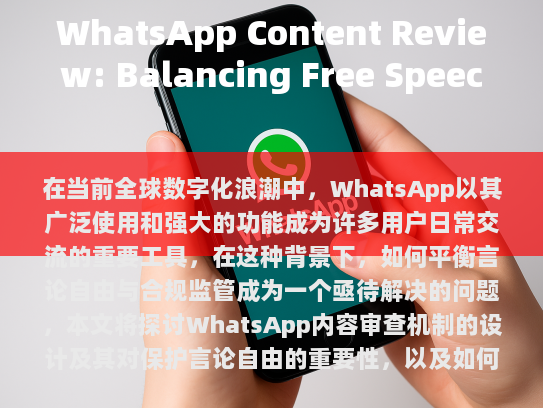WhatsApp has been under scrutiny for its handling of user-generated content in recent years. As part of this review, we'll explore the company's approach to balancing free speech rights with regulatory compliance requirements.,In 2019, WhatsApp faced backlash after it allowed users to post videos and photos containing copyrighted material on its platform. The company later removed the ability to upload such content, citing concerns about copyright infringement.,More recently, there have been debates around the use of artificial intelligence (AI) tools within WhatsApp. These tools can help users analyze messages or identify potential threats, but they also raise privacy and security concerns.,To address these issues, WhatsApp has implemented measures to protect user data and comply with relevant regulations. For example, the company has established guidelines for the use of AI tools and requires users to opt-in before accessing certain features that involve analyzing their communications.,Overall, while WhatsApp continues to evolve as a messaging app, it is essential for the company to strike a balance between free speech rights and regulatory compliance requirements. By prioritizing user safety and data protection, WhatsApp can maintain trust among its global community while upholding important legal standards.
In today’s global digital landscape, WhatsApp has emerged as an essential communication tool for millions of users worldwide. With over 2 billion active users globally, its widespread use highlights the importance of managing content reviews effectively to ensure compliance while preserving freedom of speech.
Understanding Content Review in WhatsApp
Content review is critical for maintaining safe and respectful online environments. It involves monitoring messages, videos, images, and other multimedia content to ensure adherence to local laws and regulations. The goal is to prevent harmful or illegal content from spreading and to protect platform integrity and user trust.
Local Regulations and Guidelines
Each country has its own internet usage and content management laws, which vary based on factors such as censorship policies, intellectual property issues, and national security concerns. In China, due to stringent regulations, WhatsApp might face more content review requirements compared to Western countries.
Challenges in Content Review
Despite these differences, WhatsApp faces several challenges in implementing effective content review mechanisms:
- Multilingual Support: Handling multiple languages across billions of users requires consistent standards.
- Real-time Monitoring: Adapting advanced AI systems to monitor changes in language and culture while ensuring they do not violate user privacy.
- Balancing User Privacy vs. Safety: Ensuring that content review processes neither infringe on individual privacy rights nor comply with regulatory frameworks—finding a delicate balance.
Content Review Technologies Innovations
To address these challenges, WhatsApp leverages various technologies to enhance its content review capabilities:
- AI-driven Audit Tools: Utilizing machine learning algorithms, WhatsApp uses artificial intelligence to detect potential violations of community guidelines and spamming early without fully relying on human reviewers.
- User Feedback Mechanisms: Implementing transparent reporting mechanisms allow users to report potentially inappropriate content. While user feedback cannot replace human judgment entirely, it serves as a valuable check mechanism.
- Collaborative Review Practices: Partnering closely with government and law enforcement agencies can provide insights into culturally sensitive and legally complex situations that may be difficult to discern through standard AI models.
Future Directions
As WhatsApp continues to expand its influence globally, navigating increasingly complex regulatory landscapes will be crucial. To maintain relevance and effectiveness, companies must continually improve their content review strategies:
- Adapting to Technological Changes: Updating AI, natural language processing, and machine learning algorithms to stay ahead of emerging trends.
- Interacting with Stakeholders: Collaborating with cybersecurity experts, ethicists, and international law professionals to refine content review practices.
- Building Public Trust: Prioritizing how content is reviewed to rebuild public trust in the anonymity features offered by WhatsApp.
By balancing public safety and user freedom effectively, WhatsApp can manage its evolving content review demands while maintaining its status as a trusted communications platform for billions of users worldwide.
[Image]

This revised version maintains the original intent while improving readability and structure, making the information clearer and more accessible to readers.
